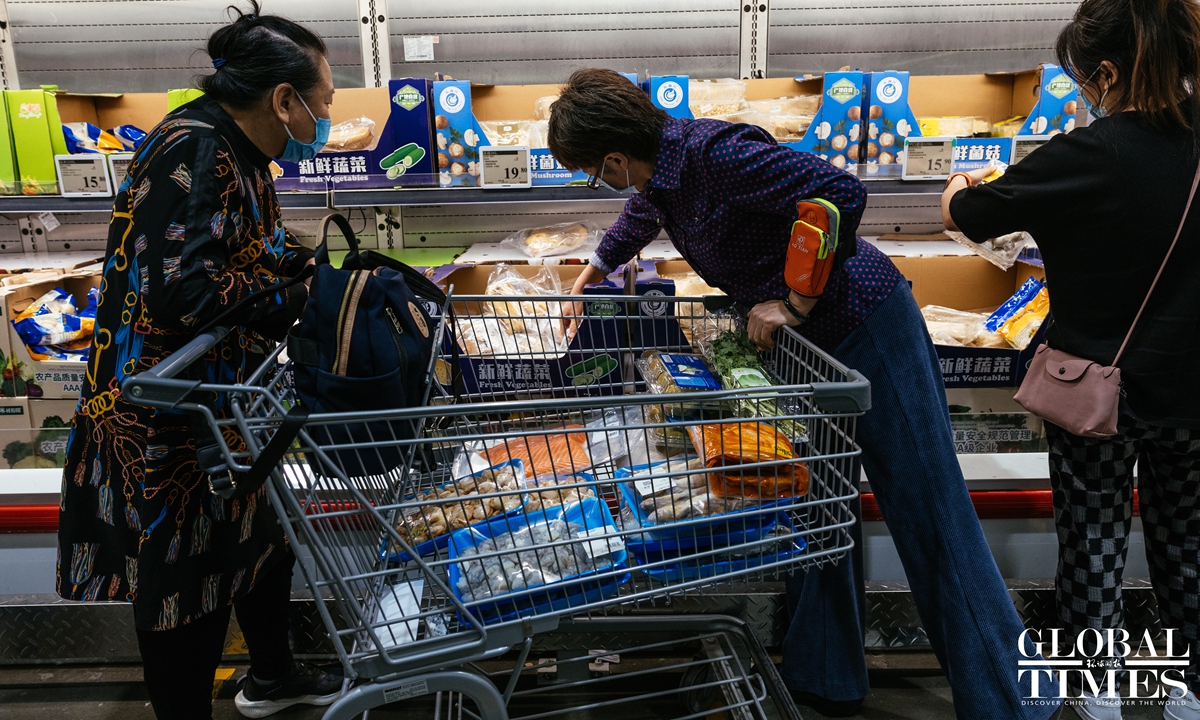
Beijing residents shop groceries in a supermarket on Sunday. (Photo: GT)
Some areas in Beijing's Chaoyang district saw residents shopping in mass for groceries after cases of COVID-19 were detected. Although several markets suffered a temporary shortages of fresh meat and vegetables, markets and online platforms replenished their goods timely and promised to follow up with normal supplies.
The city's health authorities announced on Sunday's news conference that Chaoyang district, home to nearly 3.5 million, registered 11 new COVID-19 infections between Saturday afternoon and Sunday afternoon. Among the cases were middle school students, their teachers and relatives. Two residential communities in Chaoyang district were labeled as a high-risk and medium-risk region for COVID-19 on Sunday.
As the district is set to roll out three rounds of nucleic acid testing on all residents starting Monday, some worried that certain areas may be put under lockdown and supplies might be an issue considering that residents in Shanghai experienced food shortages in the initial phase of the fight against the coronavirus.
After Sunday's afternoon news conference, a Global Times reporter visited a supermarket complex in the Hujialou neighborhood of Chaoyang district.
The supermarket was much more crowded than usual and a staff mentioned that reports about the outbreak made many residents come and shop in large quantities over the past two days but supply channels are relatively stable.
"My plan is to buy more food and daily necessities. Even if my residential area does not enter lockdown it can be used as a regular stockpile during the epidemic," a customer at the supermarket mentioned.
The Global Times visited another large supermarket in Chaoyang's Taiyanggong neighborhood and a large number of customers were shopping.
All the shopping carts at the entrance of the supermarket were fully occupied and the fresh food and vegetable section was the busiest, with dozens of people lining up to buy produce. Some of the products were sold out but there is enough supply.
People said they decided to buy some supplies after seeing reports of new cases and the notices of nucleic acid testing.
An employee at a fresh produce supermarket in the Guomao neighborhood of the city's downtown told the Global Times that the number of customers suddenly increased since Sunday afternoon.
"All the vegetables and fruits were sold out this evening," he said adding that " there will be a very good supply on Monday."
Closer to the suburbs, a supermarket in the easternmost Dingfuzhuang neighborhood of Chaoyang district, temporarily extended its closing time from 9 pm to 12 pm because of heavy traffic of customers.
Wumart, a major supermarket chain, also announced that all stores in Beijing will remain open until the last customer leaves.
Some online fresh food e-commerce platforms also experienced a supply and capacity shortages on Sunday afternoon. To ease the situation, Beijing's fresh food e-commerce companies immediately activated emergency response mechanisms to allocate and increase the supply of groceries, including meat, poultry, eggs, milk, fresh fruits and vegetables.
On Sunday afternoon, several online fresh food platforms were out of stock for users in some communities. Common vegetables such as tomatoes and potatoes were also sold out.
The number of orders in the control area has increased by more than 50 percent, with meat, poultry, eggs and milk, as well as fresh fruits and vegetables, becoming the highest priority commodities purchased by customers. Additionally, the number of sorting staff was also increased by 50 percent compared to normal weekdays, online fresh food e-commerce platform, Meituan Maicai, told media.
In response to the epidemic, another platform, Dingdong Maicai, also said it had urgently allocated supplies, increased the stock of vegetables, meat, poultry and eggs, and raised the stock of basic goods by more than 1.5 times compared to normal days.
In terms of capacity, all of Dingdong's frontline employees in high- and mid-risk areas for COVID-19 are currently on duty. The company said it will focus on ensuring the distribution of goods in these areas, according to media reports.
The Beijing Municipal Commercial Affairs Bureau also stressed at a news conference on Sunday that supplies of daily necessities are sufficient in Beijing and the transportation of supplies is operating normally.
Although Beijing has now reported 41 cases, it is uncertain whether there is a larger number of infected people, Wang Guangfa, a Beijing-based respiratory expert, told the Global Times.
Because the Omicron variant is relatively insidious and contagious, if Beijing is to keep to the dynamic zeroing policy, then it needs to react accordingly as soon as possible, including implementing mass testing or a lockdown, if needed, Wang said.
Beijing is currently asking residents who live and work in Chaoyang district to undergo nucleic acid testing on Monday, and local officials also stressed the necessity supplies.
As for the transportation of supplies, an issue of public concern, Wang said that Beijing should learn from Shenzhen's experience and focus on securing access for the transportation of supplies with policies that avoid blockages in the flow of supplies during the outbreak.
Zhao Weidong, Deputy Director of the Beijing Municipal Commerce Bureau, said on Sunday that the market supply and logistics distribution of daily necessities in Beijing are stable and in good order amid efforts to stabilize supplies and prices.


